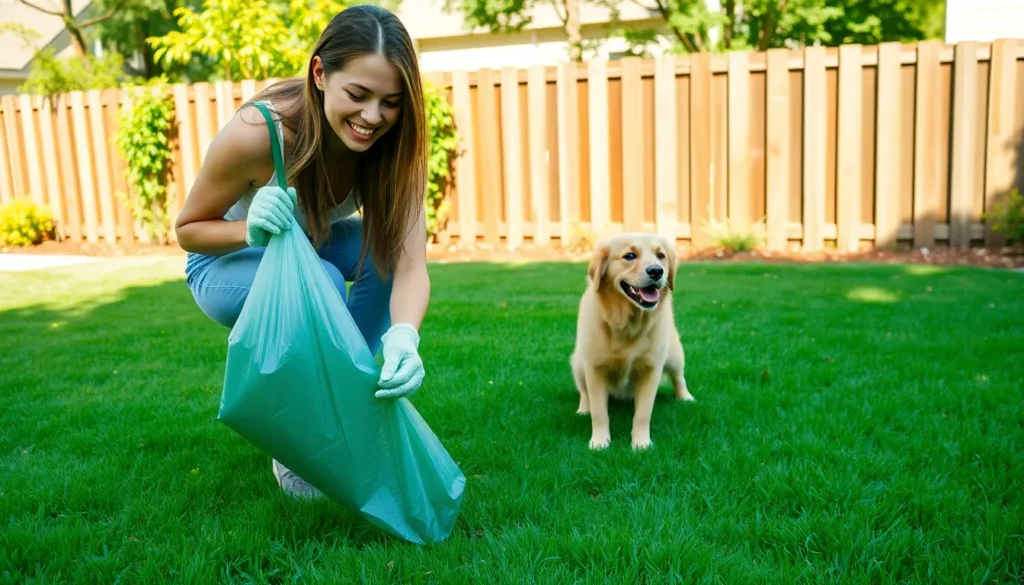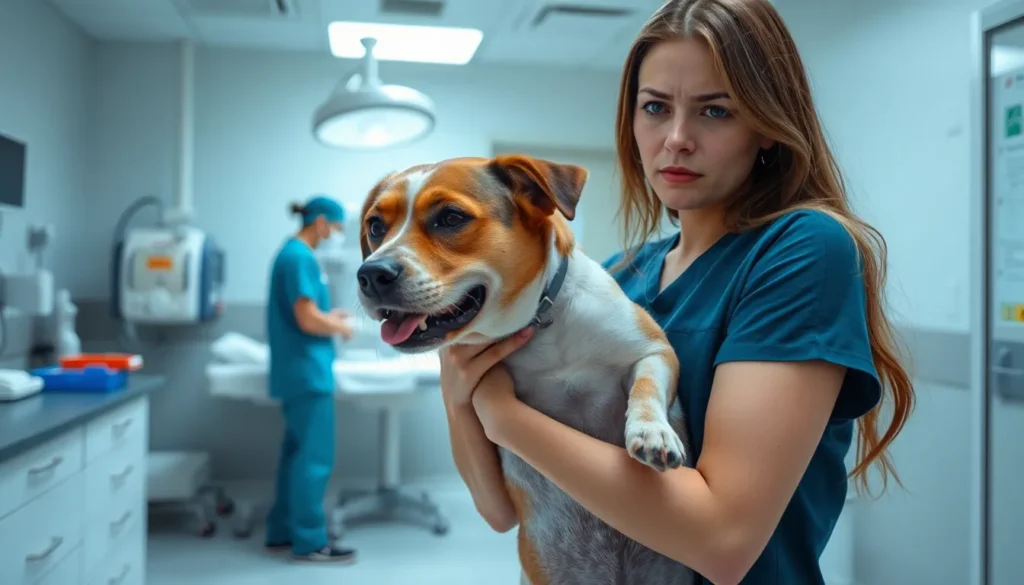Table of Contents
TogglePets, just like humans, require a balanced diet to thrive. While most pet owners focus on providing quality food, they often overlook the essential role vitamins play in their pets’ health. Vitamins are crucial for maintaining energy levels, supporting immune function, and promoting overall well-being. Understanding a pet’s specific vitamin needs can make all the difference in ensuring a long and healthy life.
Different pets have varying nutritional requirements based on their species, age, and activity level. For instance, a growing puppy has different vitamin needs compared to a senior cat. This article will explore the vital vitamins necessary for pets, how to recognize potential deficiencies, and tips for incorporating these nutrients into their daily diet. By prioritizing their pets’ vitamin intake, owners can enhance their furry friends’ quality of life and longevity.
Understanding Pet Vitamin Needs
Pets require essential vitamins for optimal health and well-being. A balanced diet that includes the right vitamins supports various bodily functions and enhances their quality of life.
Importance of Vitamins for Pets
Vitamins play a crucial role in sustaining a pet’s overall health. They contribute to energy production, immune system functionality, and healthy skin and coat. For instance, vitamin A supports vision and skin health, while B vitamins aid energy metabolism. Vitamin C boosts the immune system and serves as an antioxidant. Vitamin D helps maintain proper bone structure. A deficiency in any of these vitamins can lead to serious health issues, including weakened immune response and stunted growth.
Common Vitamin Deficiencies in Pets
Pet owners should be aware of common vitamin deficiencies that can occur.
- Vitamin A Deficiency: Leads to issues like poor eyesight and skin problems.
- Vitamin D Deficiency: Causes bone abnormalities and increased risk of fractures.
- Vitamin E Deficiency: Results in muscle weakness and poor skin health.
- B Vitamin Deficiencies: Can lead to lethargy and neurological issues.
Recognizing these deficiencies early allows for timely intervention through dietary adjustments or supplements. It’s essential for pet owners to consult with veterinarians to assess their pets’ vitamin needs accurately.
Different Types of Vitamins for Pets

Pets require various vitamins for maintaining optimal health. Understanding the different types helps ensure a balanced diet for pets.
Water-Soluble Vitamins
Water-soluble vitamins play essential roles in pet health. These vitamins dissolve in water, allowing them to be easily absorbed and excreted. Key water-soluble vitamins include:
- Vitamin B1 (Thiamine): Supports energy production and cardiovascular health.
- Vitamin B2 (Riboflavin): Aids in skin health and energy metabolism.
- Vitamin B3 (Niacin): Aids in digestion and promotes healthy fur.
- Vitamin B6 (Pyridoxine): Assists in protein metabolism and immune function.
- Vitamin B12 (Cobalamin): Crucial for red blood cell formation and neurological function.
- Folate: Important for DNA synthesis and cell division.
Pets cannot store these vitamins, so regular dietary intake is necessary to prevent deficiencies.
Fat-Soluble Vitamins
Fat-soluble vitamins are stored in the body’s fatty tissues and liver. They include:
- Vitamin A: Supports vision, skin health, and immune function. Deficiency can lead to poor night vision and skin issues.
- Vitamin D: Regulates calcium and phosphorus for bone health. Lack of this vitamin can result in bone deformities.
- Vitamin E: Acts as an antioxidant, protecting cells from damage. Deficiency can cause muscle degeneration and reproductive issues.
- Vitamin K: Essential for blood clotting and bone health. Insufficient levels can lead to bleeding disorders.
It’s vital to manage the intake of fat-soluble vitamins, as excessive amounts may result in toxicity.
Meeting Your Pet’s Vitamin Needs
Meeting pets’ vitamin requirements is essential for their overall health and well-being. Proper nutrition plays a critical role in maintaining energy levels, supporting the immune system, and enhancing longevity.
Dietary Sources of Essential Vitamins
Pets receive essential vitamins from high-quality pet food and specific dietary sources.
- Vitamin A: Found in liver, fish oils, and dark leafy greens, vitamin A supports vision and skin health.
- B Vitamins: Commonly present in meat, eggs, and whole grains, B vitamins aid in energy metabolism, digestion, and nervous system function.
- Vitamin C: Fruits like apples and blueberries offer vitamin C, which boosts immune support and acts as an antioxidant.
- Vitamin D: Obtained from fish liver oil and fortified pet foods, vitamin D is vital for calcium absorption and bone health.
- Vitamin E: Nuts, seeds, and vegetable oils are excellent sources of vitamin E, contributing to antioxidant protection and skin health.
- Vitamin K: Leafy greens, liver, and certain vegetable oils provide vitamin K, essential for blood clotting and bone metabolism.
It’s crucial for pet owners to ensure their pets consume a balanced diet that incorporates these vitamin-rich foods for optimal health.
Supplements: When and Why to Use Them
Supplements can address specific vitamin deficiencies or dietary gaps in pets’ nutrition.
- Veterinary Recommendations: Consult a veterinarian to identify nutrient deficits and get personalized supplement advice.
- Age Requirements: Older pets may need additional supplementation of vitamins such as B12 and E to support cognitive function and immune health.
- Dietary Restrictions: Pets with dietary sensitivities or restrictions may benefit from supplements to ensure they receive adequate vitamins.
- Increased Activity Levels: Active pets or working dogs often require more B vitamins for energy metabolism, necessitating use of supplements for adequate intake.
- Health Conditions: Pets with specific health conditions might need supplements to support recovery and overall wellness.
Incorporating supplements when necessary helps maintain pets’ optimal health. Always follow veterinary guidance for safe and effective supplementation.
Signs of Vitamin Deficiency in Pets
Recognizing signs of vitamin deficiency in pets is essential for maintaining their health. Both behavioral changes and physical symptoms often indicate inadequate vitamin intake.
Behavioral Changes
- Lethargy: Pets with low vitamin levels often show decreased activity and reluctance to engage in play.
- Aggression: Some pets may display unexpected aggression due to irritability linked to deficiencies.
- Anxiety: Increased nervousness or restlessness may emerge in pets with insufficient B vitamins, impacting their mental health.
- Changes in Appetite: Pets might eat less or show disinterest in food when lacking vital nutrients, leading to further health issues.
Physical Symptoms
- Poor Coat Condition: Dull, dry, or brittle fur often signifies deficiencies in vitamins A, E, or B-complex.
- Skin Irregularities: Flaky, irritated, or inflamed skin can point to a lack of essential fatty acids or vitamins C and D.
- Weight Loss: Unintentional weight loss frequently indicates vitamin inadequacies, especially in older pets.
- Impaired Vision: Vision issues may arise from inadequate vitamin A, leading to night blindness or other sight-related problems.
- Bone Fragility: Weak bones or increased fractures can signal vitamin D deficiency, undermining bone health.
Recognizing these signs promptly facilitates timely intervention through dietary changes or supplementation, improving pets’ overall well-being.
Understanding pet vitamin needs is essential for maintaining their health and vitality. A balanced intake of vitamins can significantly enhance energy levels and immune function while preventing serious health issues. Pet owners should prioritize recognizing signs of deficiencies and consult with veterinarians for tailored nutritional advice.
Incorporating high-quality foods and appropriate supplements can ensure pets receive the essential nutrients they require. With proper care and attention to their vitamin intake, pets can enjoy a longer, healthier life filled with joy and activity.








